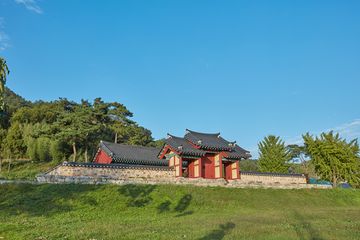성삼문선생 유허지
| 성삼문선생 유허지 Historic Site Related to Seong Sam-mun |
|
 성삼문선생 유허지, 국가문화유산포털, 문화재청. |
|
| 대표명칭 | 성삼문선생 유허지 |
|---|---|
| 영문명칭 | Historic Site Related to Seong Sam-mun |
| 한자 | 成三問先生 遺墟址 |
| 주소 | 충청남도 홍성군 홍북읍 노은리 104 |
| 지정(등록) 종목 | 시도기념물 제5호 |
| 지정(등록)일 | 1973년 12월 24일 |
| 분류 | 유적건조물/인물사건/인물기념/탄생지 |
| 시대 | 조선시대 |
| 수량/면적 | 2,640㎡ |
| 웹사이트 | 성삼문선생 유허지, 국가문화유산포털, 문화재청. |
|
|
|
해설문
국문
이곳은 성삼문의 자취가 남아 있는 곳이다.
성삼문은 수양대군이 조카 단종을 폐하고 왕위에 오르는 것에 반대한 사육신의 한 사람이다. 조선 세종(1418~1450) 때 집현전의 학자로 훈민정음 창제에 크게 공헌하였으며, 단종 폐위에 대해서도 굳은 절개를 지켜 죽임을 당했다.
조선 숙종 2년(1676)에 이량(李湸)이 사육신의 의리를 기리기 위해 집 아래에 노은사(魯隱祠)라는 사당을 세웠는데, 숙종 18년(1692)에는 녹운서원(綠雲書院)이라 하였고, 숙종 35년(1709)에는 노은서원(魯恩書院)이라 이름을 바꾸었다.
그 후 매년 제사를 지내오다가 고종 8년(1871)에 흥선대원군의 서원 철폐령에 의해 철폐되었고 후에 지방 유학자들이 사육신의 위패를 땅에 묻고 노은단(魯恩壇)을 세웠다. 현재는 이곳에서 매년 10월 20일 제사를 지내고 있다.
영문
Historic Site Related to Seong Sam-mun
This site is believed to be the birthplace of Seong Sam-mun (1418-1456), a loyal subject of the Joseon period.
Seong Sam-mun was a scholar-official at the Hall of Worthies (called Jiphyeonjeon in Korean), who contributed to the invention of the Korean writing system Hangeul. When in 1455 King Danjong’s (r. 1452-1455) throne was usurped by his uncle King Sejo (r. 1455-1468), Seong together with others opposing the new king plotted to kill King Sejo and return the throne to King Danjong. However, their plan was exposed, and as a result, Seong was tortured and executed. The six officials, including Seong, who were executed by King Sejo are called the Six Martyred Ministers.
Seong was born in this village, in what was the house of his mother's family. In 1676, a shrine honoring the Six Martyred Ministers was established on this site. However, the shrine was once demolished when most shrines and Confucian academies were shut down by a nationwide decree in the late 19th century. Local Confucian scholars in this area buried their ancestral tablets and built an altar instead to perform a ritual. In 2006, a new shrine honoring Seong Sam-mun was built here. The previous altar still exists on a hill to the left of the shrine.
In this village is also a historic house of the descendants of Seong Sam-mun (National Folklore Heritage No. 231).
영문 해설 내용
이곳은 조선시대의 충신 성삼문(1418-1456)이 태어난 집이 있던 곳이다.
성삼문은 이곳 홍주(현 홍북면 노은리) 출신이며, 조선 세종 때 집현전의 학자로 훈민정음 창제에 공헌하였다. 수양대군이 조카 단종을 폐하고 왕위에 오르는 것에 반대하였고, 단종을 복위시키려 모의했다고 죽임을 당한 사육신의 한 사람이다.
1676년 이곳에 사당을 세우고 사육신을 배향하였다. 그러나 19세기 말 서원철폐령으로 사당은 폐쇄되었고, 지방 유학자들이 사육신의 위패를 땅에 묻고 제단을 만들어 제향을 올렸다. 2006년 이 유적지에 성삼문을 기리는 사당이 새로 지어졌다. 제단은 사당의 왼쪽 언덕 위에 있다.
이 마을에는 성삼문의 외손자가 살았다는 고택(국가민속문화재 제231호)이 남아있다.